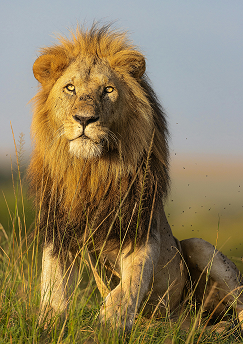In honor of Father’s Day, celebrated in several countries on the third Sunday in June, at 3Love Inc. we want to pay tribute to the most amazing fathers in the animal kingdom, who inspire us with the dedication and love with which they raise and protect their children.
- Emperor penguin
According to the organization Natural Habitat Adventures, emperor penguin fathers are a great example of dedication. When the female lays the egg, she has expended so much energy that her nutritional reserves are depleted, and she must leave for the sea for two months to search for food. During that time, the male takes on the role of single parent, keeping the egg warm by carefully balancing it between his toes and belly. He takes his responsibility very seriously and does not eat or move for two full months, because if the egg is exposed to the extreme cold of Antarctica, the chick will not survive.
- Lion
When a threat appears, the male lion steps forward and becomes fiercely protective of his pride, which can consist of 30 or more members, including lionesses and cubs. When he senses danger, his paternal instinct kicks in and he does everything possible to ensure the safety of his family.
- Gorilla
A father is usually in charge of a clan of up to 30 gorillas. He is responsible for finding food for his group, which is a big task, as gorillas typically eat up to 22 kilograms of food per day. Gorilla fathers are also very protective and defend their young from threats by beating their chests fiercely and attacking enemies. They often have to fight other male gorillas to defend their young. A gorilla father spends a lot of time with his young until they reach adolescence, playing affectionately with them.
- Red fox
Male red foxes are loving fathers. They enjoy playing and romping with their cubs, like most fathers. While the cubs are small, the father hunts every day and brings food back to the den for the cubs and their mother. However, after about three months, the cubs get a surprise because the free food runs out. The father stops feeding them as a tactic to get them to leave the den. But he doesn’t leave them without food all at once; instead, he buries food near the den to teach them to sniff out and search for food.
- African wild dog
As with domestic dogs, African wild dog pups are extremely active and consume a lot of calories throughout the day. Since pups cannot eat solid food until they are about 10 weeks old, their father swallows his food and then regurgitates it in a softer form for the pups to eat, ensuring that they get enough nutrition. This feeding practice also serves another purpose: since the pups depend on their parents for food, this prevents them from straying too far from home, so they do not fall prey to enemies.
- Flamingo
Even when they gather in flocks of thousands, male flamingos remain monogamous and mate with a single special female throughout their lives. Flamingo fathers firmly believe in gender equality, something rare in the animal kingdom. When it’s time to mate, the father helps the mother select a nesting site, and together they build the nest. Once she lays the egg, the father shares the responsibility of incubating it, as they take turns sitting on the nest for equal periods of time. Once the chick is born, the mother and father share all parenting duties equally.
- Frogs and toads
In general, most species of frogs and toads have very dedicated parents. Some males keep their tadpoles in their mouths until they are able to fend for themselves. Other amphibian fathers, such as the midwife toad, implant their eggs under their skin, usually on the back of their legs. The pouched frog carries its young in a pouch on its belly while they develop, much like kangaroos or possums do.
- Seahorse
Male seahorses go above and beyond when it comes to parenting, as they are one of the only species in the animal kingdom known for male pregnancy. The female seahorse deposits her eggs into the male’s pouch; he then fertilizes and incubates the eggs for 45 days until they hatch into fully developed baby seahorses. Male seahorses may not experience morning sickness, but they do have to endure contractions during childbirth.


